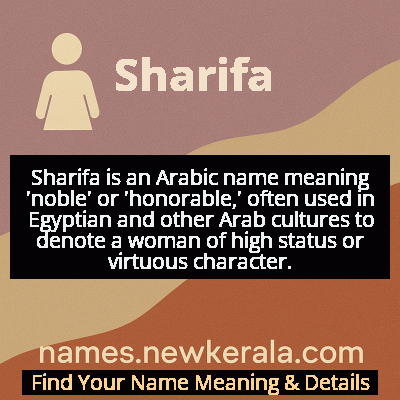Sharifa Name Meaning & Details
Origin, Popularity, Numerology Analysis & Name Meaning of Sharifa
Discover the origin, meaning, and cultural significance of the name SHARIFA. Delve into its historical roots and explore the lasting impact it has had on communities and traditions.
Name
Sharifa
Gender
Female
Origin
Egyptian
Lucky Number
8
Meaning of the Name - Sharifa
Sharifa is an Arabic name meaning 'noble' or 'honorable,' often used in Egyptian and other Arab cultures to denote a woman of high status or virtuous character.
Sharifa - Complete Numerology Analysis
Your Numerology Number
Based on Pythagorean Numerology System
Ruling Planet
Saturn
Positive Nature
Ambitious, efficient, realistic, and authoritative.
Negative Traits
Materialistic, stressed, confrontational, and can be overly ambitious.
Lucky Colours
Dark blue, black.
Lucky Days
Saturday.
Lucky Stones
Blue sapphire, amethyst.
Harmony Numbers
2, 4, 6.
Best Suited Professions
Business leaders, managers, financial services, law enforcement.
What People Like About You
Leadership, determination, organizational skills.
Famous People Named Sharifa
Sharifa Fadel
Actress
Pioneering Egyptian actress known for roles in classic Egyptian cinema during the 1940s-1960s
Sharifa Fatma bint Ali
Royalty
Princess of Egypt and granddaughter of Khedive Ismail, known for her charitable work and cultural patronage
Sharifa Zayed
Educator
Renowned Egyptian educator and women's rights advocate, founder of multiple educational institutions in Cairo
Sharifa Al-Mahdi
Political Activist
Sudanese-Egyptian activist known for her work in human rights and democratic reform movements
Name Variations & International Equivalents
Click on blue names to explore their detailed meanings. Gray names with will be available soon.
Cultural & Historical Significance
Extended Personality Analysis
Women named Sharifa are typically characterized by their natural dignity, strong moral principles, and leadership qualities that inspire respect and admiration. They often possess an innate sense of responsibility and tend to be the pillars of their families and communities—the ones others turn to for wise counsel and guidance. Sharifas usually demonstrate exceptional emotional intelligence, able to navigate complex social situations with grace and diplomacy. Their thoughtful, measured approach to decision-making makes them excellent problem-solvers and mediators. While they carry themselves with a certain reserve and formality in public, those who know them well appreciate their warmth, loyalty, and deep capacity for caring. Many Sharifas develop strong interests in education, social justice, or community service, feeling compelled to use their natural leadership abilities for the greater good. They typically value tradition and stability but are not resistant to change—rather, they prefer to guide evolution thoughtfully rather than embrace revolution recklessly. This balance of respect for heritage with forward-thinking vision makes Sharifas particularly effective in roles that require bridging different generations or cultural perspectives.
Modern Usage & Popularity
In contemporary Egyptian society, Sharifa maintains its status as a respected and meaningful name choice, though its usage patterns have evolved with changing social dynamics. While historically more common among aristocratic and educated urban families, the name has become more democratized across different social classes while retaining its connotations of dignity and respectability. Modern Egyptian parents often choose Sharifa to honor family traditions and express aspirations for their daughters to embody qualities of leadership, integrity, and social responsibility. The name enjoys steady, moderate popularity in Egypt, consistently ranking within the top 200 female names, with particular strength in cosmopolitan centers like Cairo and Alexandria where its blend of traditional values and modern relevance resonates strongly. Internationally, Sharifa has gained visibility through the Egyptian diaspora, appearing in European and North American name registries, though often in adapted forms like 'Sherifa' or 'Charifa.' The name's enduring appeal lies in its perfect balance of cultural depth, elegant sound, and meaningful symbolism that transcends generations while remaining firmly rooted in Egyptian and Islamic heritage.
Symbolic & Spiritual Meanings
Sharifa carries rich symbolic meanings that extend far beyond its literal translation of 'respected' or 'honorable.' The name symbolizes moral authority, social responsibility, and the ideal of feminine leadership grounded in wisdom and integrity. Symbolically, Sharifa represents the bridge between tradition and progress—someone who honors heritage while thoughtfully guiding evolution. The name evokes the image of a moral compass, pointing toward ethical direction and principled action in personal and community life. In metaphorical terms, Sharifa symbolizes the pillar of society—the strong, stable foundation that supports and guides others while maintaining dignity and grace under pressure. The name also carries connotations of light and guidance, suggesting someone who illuminates the right path for others through their example and wisdom. This symbolic weight makes Sharifa particularly meaningful in cultures that value both individual achievement and collective responsibility, representing the ideal of leadership that serves rather than dominates, that guides rather than commands, and that earns respect through character rather than demands it through position.

